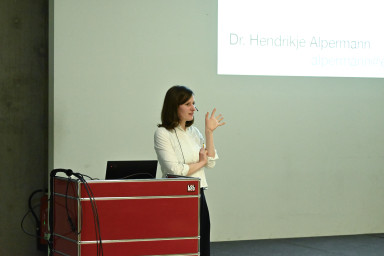30 Jan, 2024, 17:00Auditorium, HCU
Dr. Hendrikje Alpermann (Viadrina University)
Challenging objects in urban future-making: Presence, resistance, and decay of buildings on standby

Image © Clara Mross.
Abstract
The built environment serves as a testament not only to materialized but also to unrealized and partially realized possible futures. Amidst the backdrop of rapid and extensive urban change, this lecture explores things that endure, focusing on in-between spaces that challenge urban future-making.
Conceptually, it follows on from fruitful debates at the nexus of STS, actor-network theory, and urban studies, where the role of materiality in change and as an obstacle to urban change has been addressed under the concepts of ‘obduracy’ and ‘resistance’.
The lecture is based on the study of practical engagement with a high-rise ensemble in Halle (Saale), eastern Germany, which was abandoned towards the end of the 1990s and has since been an object of future-making. Numerous possible futures between demolition and preservation have been un-/made for the ensemble throughout the years but have never materialized. As a result, the buildings, known as the Hochhausscheiben, are lingering in an in-between state which can best be described as a ‘standby mode.’
Three main arguments are developed: (1) it is the buildings’ material presence and persistence that imposes an engagement with possible futures for the buildings; (2) there are material limits to what is possible (limits through decay, but also material resistance – both material fragility and stability) that contribute to a prolonged in-between in the present; and (3) standby requires maintenance, even if at a minimum level, not only to prevent material collapse but also to secure the potentiality that is nurturing standby.
About the lecturer
Hendrikje Alpermann works at the European University Viadrina Frankfurt (Oder). She is interested in architecture, planning, urban transformation, and knowledge production. After her bachelor’s in ethnology at the Universities of Leipzig, Halle-Wittenberg, and Tbilisi, she focused on urban studies during her master’s at the European University Viadrina and the Paris School of Urban Planning (EUP). She then worked as a research assistant at the Leibnitz Institute for Research on Society and Space (IRS) in Erkner and completed her doctoral dissertation at the University of Lausanne in 2023, where she worked as an assistant from 2018 to 2023. Her dissertation, which was awarded the prize of the University’s Faculty of Geosciences and Environment, will be published in spring 2024.